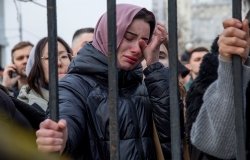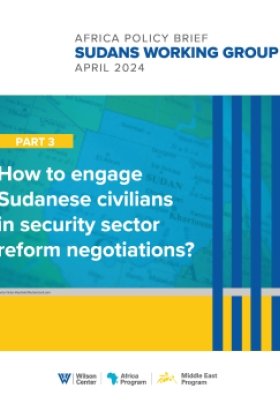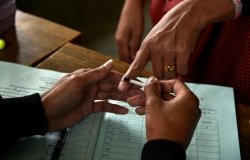National Reconciliation in Iraq
Only Iraqis can end the violence in their country. Former congressman Lee Hamilton lays out steps that Iraq must take to achieve national reconciliation.
Call it what you want – sectarian conflict, civil war, terrorism – violence in Iraq is now mostly rooted in disagreements among Iraqis. The United States has a significant role to play in helping to stabilize Iraq. Yet lasting peace and stability is only possible if Iraqis achieve national reconciliation.
Just what is meant by national reconciliation? For the Sunni insurgency to end, Iraq's Sunni Arabs must believe they can get a fair deal through the political process. For Shiite militias to stop killing Sunnis and attacking each another, Shia factions must accept a view of democracy in which political power is not absolute. For Iraq to avoid partition, Iraq's Kurds must balance a desire for greater autonomy with the benefits of a unified Iraq. The violence underscores the difficulty of the task, but there is wide agreement on what benchmarks need to be met to advance national reconciliation.
Iraqis have made fitful progress in one area: managing Iraq's vast oil wealth. In February, Iraqis agreed on a framework law to ensure that all revenue from oil sales will go into a single national account, and be shared on the basis of population. However, measures to implement this agreement, reorganize the state oil company, and regulate contracts with foreign companies need to be drafted. Final approval is likely months away.
Iraq's constitution must also be reviewed on an urgent basis. The constitution was drafted primarily by Shia and Kurdish leaders, and was agreed upon and ratified in 2005. To mollify Sunnis, it included a last-minute provision mandating review of the constitution for possible amendment. A Constitutional Review Committee set up by parliament met in November. Prime Minister Nouri al-Maliki's own plan calls for a referendum, if necessary, on constitutional amendments by March 2007. So far, there is little progress to report.
One Constitutional provision that should be revised deals with Kirkuk, a city with a volatile mix of Arabs, Kurds and Turkmen. The Constitution required a referendum on future control of Kirkuk before the end of 2007, a provision sought by Kurds. However, this would be explosive, enflaming sectarian violence, and perhaps sparking a conflict between Sunni Arabs and Kurds over control of the city. The referendum should be delayed. International diplomatic and arbitration efforts are needed to avert further violence.
To incorporate Sunnis into public life, De-Baathification restrictions must be revised for all but the leading members of Saddam Hussein's regime. After the overthrow of Saddam Hussein, tens of thousands of members of his Baath party were banned from government, resulting in widespread alienation of Sunnis, and a loss of critical professional expertise. Prime Minister Maliki's target date for a law to relax current restrictions was December, but little progress has been made. Similarly, Maliki's amnesty proposals for Sunni combatants have gained little traction. These amnesty proposals must be far-reaching, as Iraqi leaders must find ways to reconcile with former bitter enemies.
Another key step is the holding of provincial elections. Sunni Arabs boycotted the January 2005 elections. As a result, Sunnis are greatly underrepresented in provincial assemblies and local councils. Under Iraq's constitution, new provincial elections should have been held already. New provincial elections should be held at the earliest possible date. Prime Minister Maliki's target date for provincial elections is June. Key issues, including dates and the structure of elections, remain unresolved.
Lasting peace will also depend upon a law on militias. The Iraqi government – backed by the United States – should use force to stop militias that act as death squads, or use violence against the state. However, given the prevalence of militias within Iraqi life, dealing with militias requires long-term attention and substantial funding to disarm, demobilize, and re-integrate militia members into civilian society. The Iraqi government did not meet a target date of December for a law on militias.
Finally, to be comprehensive, national reconciliation should assure a place in Iraq for all Iraqis. The rights of women and minorities must be protected. And civil society should be safeguarded from government infringement, as the registration of non-governmental groups is often used as a tool for politicizing or stopping civil society activities.
Steps toward national reconciliation will not be easy to take. Even if all the measures outlined above are carried out in good faith, there is no guarantee that the violence will soon end. Yet there is one certainty: if these measures are not carried out, the prospects for peace are grim. As one American general told the Iraq Study Group, if the Iraqis do not reconcile, "all the troops in the world will not provide security."









